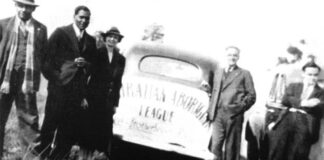The failure of the Voice referendum left racists and the right emboldened.
The Albanese government has opened the door for the racist onslaught. It refused to fight for Indigenous rights through the referendum campaign, saying the body would have no real power.
The referendum provided a useful distraction from Albanese’s own racist policy agenda. His government continues to enforce apartheid-style laws against NT Aboriginal communities, continuing measures started in 2007 with John Howard’s Intervention.
Nationally, the number of Indigenous prisoners increased 15 per cent in the year to June 2024. Indigenous people in Australia are already the most incarcerated on the planet—36 per cent of the prison population but only 3.8 per cent of the total population.
Labor and Liberal state governments around the country have been driving up these numbers, running a harsh “law and order” agenda.
And Albanese has done nothing to address the cost of living crisis hitting Indigenous people hardest, pushing people into homelessness and prison.
Racist panic
There has been a particularly racist panic about “youth crime”.
In October one of the first acts of the new Country Liberal Party (CLP) government in the NT was to lower the age of criminal responsibility to 10. This means 10 and 11-year-olds can now be locked up in youth prisons. In the NT, typically 100 per cent of the children in detention are Indigenous.
These children grow up facing extreme social deprivation.
“Most of these kids are experiencing poverty, disability, removal, poor health, low education, and trauma,” Tiwi woman and Justice Not Jails spokesperson Yvonne Dunn explained.
In prison they are “treated like animals”, the group says, with youth prisons, “notoriously overcrowded, presenting serious physical and mental health risks to prisoners”.
The CLP has also made it harder to get bail, including for children. Prison numbers have skyrocketed, with police watch houses and prisons overflowing.
Similarly, in Queensland, “youth crime” legislation was the new Liberal National Party government’s first act in November, following its election.
Never mind that rates of youth crime have been falling for two decades and offences were down 6.7 per cent last year, according to Queensland police data.
Its new laws target Indigenous children, who make up 70 per cent of children in detention. They make it easier to lock up kids by removing the principle of detaining children as a last resort, along with draconian “adult crime, adult time” measures increasing sentences for youth offences.
This meant again over-riding the Human Rights Act, continuing the legacy of the outgoing Queensland Labor government that also twice suspended it to lock up more kids.
These laws will do nothing to make Queenslanders safer or reduce crime. According to National Voice for our Children chief executive Catherine Liddle, “Over 90 per cent of children who leave detention in Queensland will return to the system within the year.”
Truth-telling
Peter Dutton is demanding further attacks on Indigenous rights.
Many local councils have moved citizenship ceremonies from 26 January, recognising that it marks the beginning of colonisation and genocide. Dutton announced he would force them back to Invasion Day.
Albanese refused to stand up to Dutton’s racism and responded by declaring he’d “look forward to celebrating Australia Day”.
Dutton has also vowed to remove the Aboriginal and Torres Strait Islander flags from government press conferences.
Albanese has backed away from his promise to set up a truth-telling commission, or Makarrata.
Promises to replace the exploitative CDP scheme, where more than 40,000 Indigenous people are forced to work for quarantined Centrelink payments with “real jobs” have come to almost nothing, with less than 1000 jobs created out of a promised maximum of 3000.
A renewed Aboriginal rights movement is desperately needed.
The Gomeroi campaign against Santos’ Pilliga gas project is an example of how to fight and win broad support. A final decision on their appeal at the Native Title Tribunal is expected in March.
Unions have backed the campaign and organised several protest tours to the Pilliga. The most recent, in October, involved members of the Maritime Union of Australia, the Independent Education Union and the nurses’ union alongside climate activists.
This is the kind of fight needed to stand up for Indigenous rights.
By Luke Ottavi






